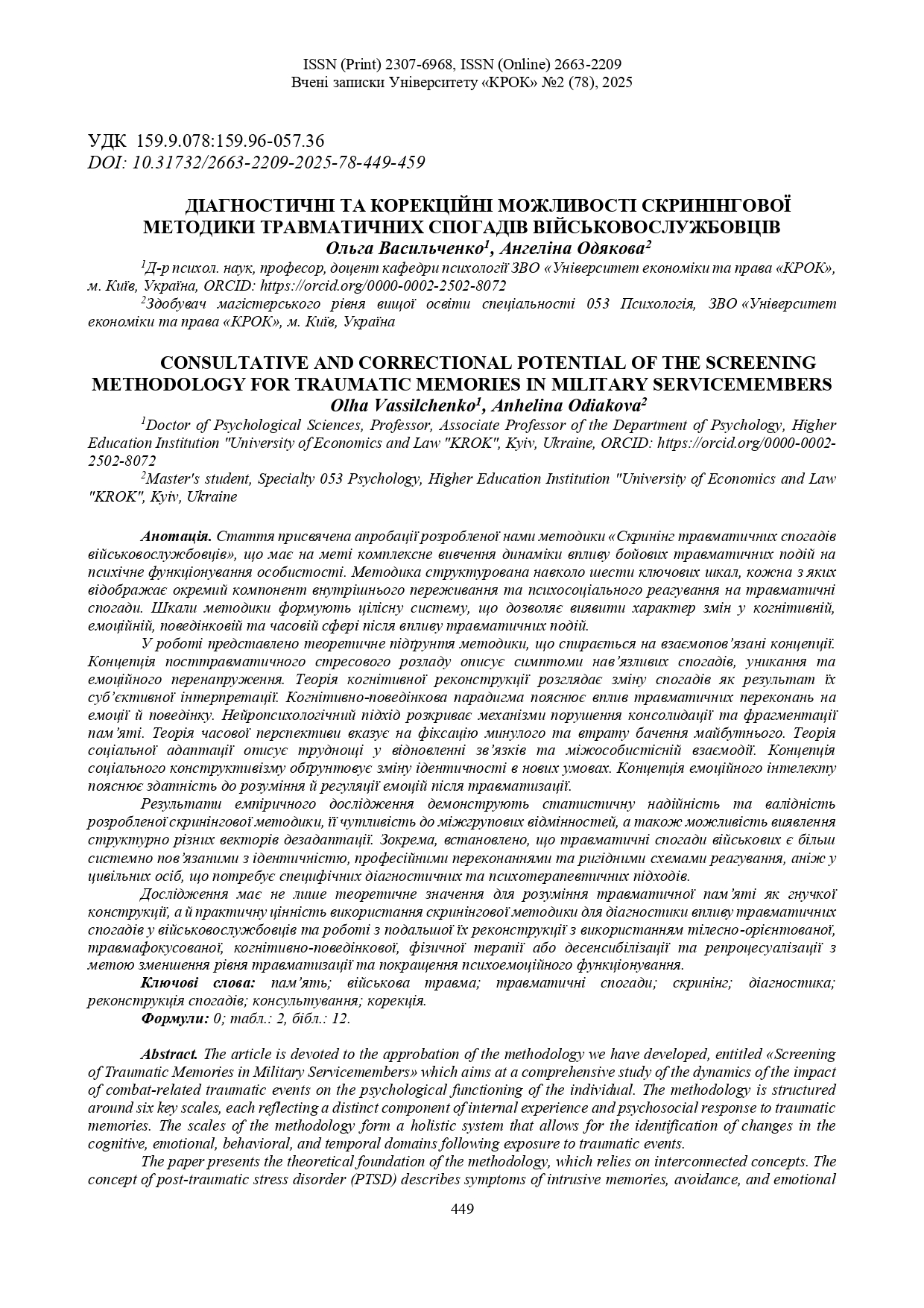CONSULTATIVE AND CORRECTIONAL POTENTIAL OF THE SCREENING METHODOLOGY FOR TRAUMATIC MEMORIES IN MILITARY SERVICEMEMBERS
DOI:
https://doi.org/10.31732/2663-2209-2025-78-449-459Keywords:
memory, military trauma, traumatic memories, screening, diagnostics, memory reconstruction, counseling, correctionAbstract
The article is devoted to the approbation of the methodology we have developed, entitled «Screening of Traumatic Memories in Military Servicemembers» which aims at a comprehensive study of the dynamics of the impact of combat-related traumatic events on the psychological functioning of the individual. The methodology is structured around six key scales, each reflecting a distinct component of internal experience and psychosocial response to traumatic memories. The scales of the methodology form a holistic system that allows for the identification of changes in the cognitive, emotional, behavioral, and temporal domains following exposure to traumatic events.
The paper presents the theoretical foundation of the methodology, which relies on interconnected concepts. The concept of post-traumatic stress disorder (PTSD) describes symptoms of intrusive memories, avoidance, and emotional hyperarousal. The theory of cognitive reconstruction views the alteration of memories as a result of their subjective interpretation. The cognitive-behavioral paradigm explains how traumatic beliefs influence emotions and behavior. A neuropsychological approach reveals the mechanisms of impaired memory consolidation and fragmentation. The theory of temporal perspective indicates a fixation on the past and a loss of future orientation. Social adaptation theory describes difficulties in restoring social connections and interpersonal interaction. The concept of social constructivism substantiates the change in identity under new conditions. The concept of emotional intelligence explains the ability to understand and regulate emotions after traumatization.
The results of the empirical study demonstrate the statistical reliability and validity of the developed screening methodology, its sensitivity to intergroup differences, and its ability to identify structurally distinct vectors of maladaptation. Specifically, it was found that traumatic memories in military personnel are more systemically linked to identity, professional beliefs, and rigid response patterns than in civilians, which necessitates specific diagnostic and psychotherapeutic approaches.
The study holds not only theoretical significance for understanding traumatic memory as a flexible construct but also practical value for using the screening methodology to diagnose the impact of traumatic memories in military personnel and in the subsequent work of their reconstruction. This reconstruction can be achieved through body-oriented, trauma-focused, cognitive-behavioral, physical therapy, or desensitization and reprocessing, with the aim of reducing the level of traumatization and improving psycho-emotional functioning.
Downloads
References
Афанасьєва, Н. (2016). Психологічне консультування клієнтів при трансформації часової перспективи внаслідок травматизації. Проблеми екстремальної та кризової психології, 19, 3–12.
Василюк, О. (2013). Теоретико-методологічний аналіз поняття «Травматична пам’ять» в руслі когнітивного підходу. Матеріали І Міжнародної науково-практичної конференції «Когнітивні та емоційно-поведінкові фактори повноцінного функціонування людини: культурно-історичний підхід», (18 – 19 жовтня). Харків: ХНПУ. 358–360.
Горбунова, В. (2015). Робота з посттравматичним стресовим розладом (ПТСР) у межах когнітивно-поведінкової терапії. Психологічна допомога особистості, що переживає наслідки травматичних подій: зб. статей. Ін-т соціальної та політичної психології. Київ, Міленіум. 26–34.
Климчук, В. (2021). Психологія посттравматичного зростання: монографія. Національна академія педагогічних наук України, Інститут соціальної та політичної психології (2-ге вид., переробл. і допов). Кропивницький: Імекс-ЛТД, 2021. 158.
Одякова, А., & Васильченко, О. (2025). Реконструкція травматичних спогадів військовослужбовців. Матеріали VIІІ Всеукраїнських психологічних читань «Удосконалення професійної майстерності майбутніх психологів» за темою «Психологічна допомога особистості у воєнний період». Умань. 16–20.
Одякова, А., Васильченко, О., & Павленко, О. (2025). Методологічні засади скринінгу травматичних спогадів військовослужбовців. XІІ Всеукраїнської науково-практичної конференції «Розвиток основних напрямів соціогуманітарних наук: проблеми та перспективи». Кам’янське. 371–386.
De Brigard, F., Umanath, S., & Irish, M. (2022). Rethinking the distinction between episodic and semantic memory: Insights from the past, present, and future. Memory & Cognition, 50(3), 459–463.
Grimell, J. (2024). You can take a person out of the military, but you can’t take the military out of the person: Findings from a ten-year identity study on transition from military to civilian life. Frontiers in Sociology, 9, 1–13.
Kleykamp, M., Montgomery, S., Pang, A., & Schrader, K. (2021). Military identity and planning for the transition out of the military. Military Psychology, 33(6), 372 – 391.
Rubin, D., Schrauf, R., & Greenberg, D. (2003). Belief and recollection of autobiographical memories. Memory & Cognition, 31, 887–901.
Tulving, E. (2000). Concepts of memory. The Oxford handbook of memory. 33–43.
Xue, G. (2022). From remembering to reconstruction: The transformative neural representation of episodic memory. Progress in neurobiology, 219, 5–20.

Downloads
Published
How to Cite
Issue
Section
License

This work is licensed under a Creative Commons Attribution-NonCommercial 4.0 International License.

